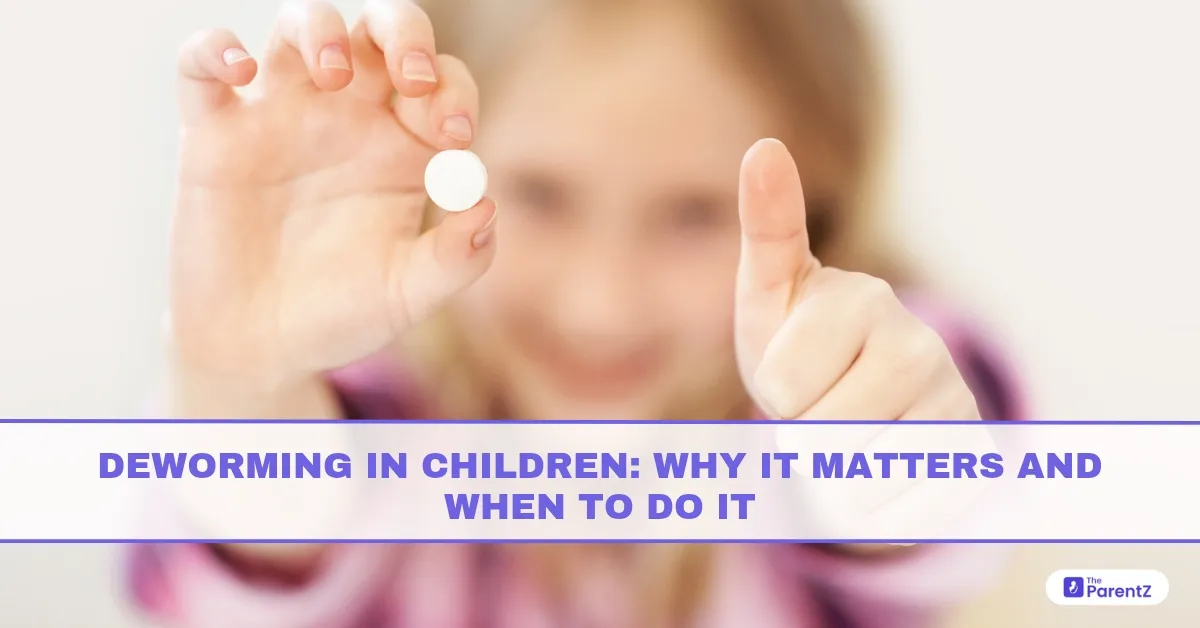You may have heard your pediatrician mention “deworming,” or perhaps you’ve seen government campaigns about giving deworming tablets in schools. At first, it might sound like unsettling worms in children. But the truth is, intestinal worm infections are very common, especially in countries with warm climates and limited sanitation.
The good news? They’re easily preventable and treatable. Understanding why deworming matters and when to do it can make a big difference in your child’s health, growth, and well-being.
What Is Deworming?
Deworming refers to the medical treatment of parasitic worm infections in the intestines. The most common culprits are:
- Roundworms (Ascaris)
- Hookworms
- Whipworms (Trichuris)
- Pinworms (Enterobius)
These worms live in the intestines and may enter the body through contaminated food, water, soil, or unwashed hands, especially in areas with poor sanitation.
Once inside, they compete for nutrients, cause irritation, and in some cases, trigger more serious health issues.
Why Deworming Matters
Children, especially those between 1 and 14 years old, are particularly at risk. They play outside, explore with their hands, and may not wash up properly before eating.
Left untreated, worm infections can lead to:
- Poor weight gain or weight loss
- Nutritional deficiencies, including iron deficiency anemia
- Stomach aches and digestive issues
- Fatigue and irritability
- Poor concentration and school performance
- In severe cases, intestinal blockages or organ damage
Regular deworming can break this cycle, allowing children to grow, learn, and thrive.
Common Signs of Worm Infection in Children
Worm infections can sometimes be “silent,” with no clear symptoms. But here are signs to watch for:
- Complaints of stomach pain
- Itching around the anus, especially at night (a classic sign of pinworms)
- Weight loss or poor appetite
- Visible worms in stool or vomit
- Frequent nausea or vomiting
- Fatigue, pallor, or weakness
- Teeth grinding at night (occasionally noted, though not specific)
If you notice these symptoms, consult your child’s doctor for evaluation and testing if needed.
When to Deworm
1. Routine Deworming (Without Symptoms)
In India and other high-risk countries, the World Health Organization (WHO) and Indian health authorities recommend routine deworming for all children.
Guidelines:
- Every 6 months starting at 12 months of age in high-risk areas
- Continue until the child is at least 14 years old
- Commonly done as part of school health programs (like India’s National Deworming Day in February and August)
This routine approach helps prevent the buildup of worm burden, even when there are no obvious symptoms.
2. Symptomatic Deworming
If your child has symptoms suggestive of worms, your pediatrician may advise deworming sooner, even outside the routine schedule.
3. After Travel or Exposure
If your child has traveled to areas with poor hygiene, or played barefoot in dirt, or come into contact with known infections, a one-time deworming dose may be recommended.
What Medicines Are Used?
The most common deworming medications are:
- Albendazole (400 mg) – the standard for routine deworming
- Mebendazole – an alternative option
- Pyrantel pamoate – often used for pinworm infections
- Combination therapy – used for stubborn or repeated infections
For younger children (12–24 months), the dose is usually half a tablet (200 mg) of albendazole. Older children can take the full 400 mg tablet.
Always consult your doctor for the correct dose, timing, and safety instructions.
Are There Any Side Effects?
Deworming medicines are very safe, and side effects are usually mild. Some children may experience:
- Nausea or mild stomach discomfort
- Temporary diarrhea
- Drowsiness or fatigue
These are typically short-lived and resolve on their own. If your child vomits within 30 minutes of taking the medicine, consult your doctor. You may need to repeat the dose.
What About Adults?
Deworming isn’t just for kids. If you live in high-risk areas or have signs of infection, your doctor may also recommend family-wide treatment, especially if one child tests positive.
How to Prevent Worm Infections
Along with deworming, everyday habits are powerful tools:
- Wash hands with soap and water before eating and after using the toilet
- Keep nails short and clean
- Avoid walking barefoot in soil or sand
- Drink filtered or boiled water
- Wash fruits and vegetables thoroughly
- Teach children not to put dirty fingers or toys in their mouths
- Treat and deworm pets if needed
- Regular cleaning of toilets, bedding, and clothes
Conclusion: Simple Steps, Big Impact
Deworming might feel like a small task, but it can lead to major health gains for your child. In regions where worm infections are common, a regular deworming routine is just as important as vaccines or good nutrition.
When in doubt, talk to your child’s doctor. With a little vigilance and the right treatment, your child can stay active, well-nourished, and full of energy just the way childhood should be.





Be the first one to comment on this story.